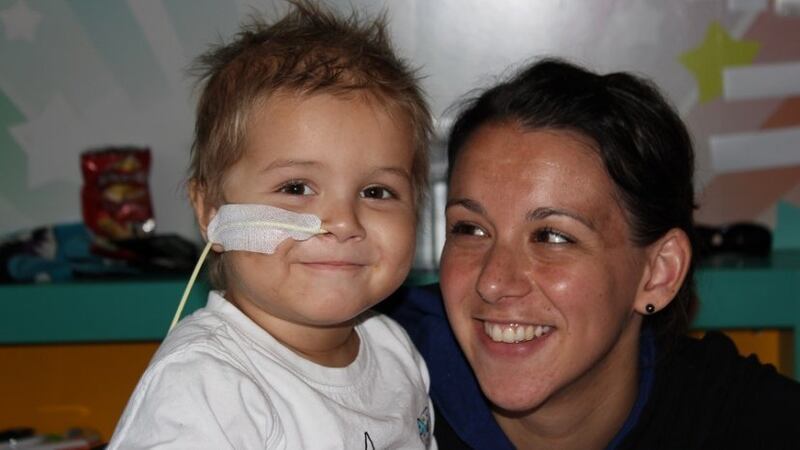Keri Topperwien with her son Chace who died in 2012 from leukaemia. She hopes her research will help increase the number of Māori bone marrow donations. photo/supplied
A Whakatāne mum who set up a charity with her husband to help support whanāu who have a child with cancer has been awarded a community research grant from the Health Research Council (HRC) to explore Māori perspectives on bone marrow donation.
Established in memory of her son Chace, the Dream Chaser Foundation is a national registered charity co-led by Keri Topperwien (Ngāti Awa, Ngāti Porou).
Chace (Ngāti Awa, Ngāti Porou, Tūhoe) died in 2012 at just three years old after being diagnosed with acute myeloid leukaemia, an aggressive type of cancer of the blood and bone marrow.
Keri will use her HRC Ngā Kanohi Kitea development grant to build connections and prepare to undertake kaupapa Māori research that targets opportunities for increasing the number of bone marrow donors in Aotearoa, particularly among Māori.
“The best chance Chace had of surviving leukaemia was a bone marrow transplant to replace the cancerous cells within his bones with donated healthy marrow,” Topperwien says.
“However, unlike with blood, certain markers need to align to be a bone marrow match, meaning that Chace’s match was most likely going to be from a Māori donor. At the time, there were 26 million bone marrow donors on the international bone marrow registry, however only 6000 were Māori – but none was a match to our son.”
Reality for ethnic minorities
Keri says this devastating experience is not unique but reflects a reality for many Māori, Pacific Island and other ethnic minority groups searching for a donor match due to their underrepresentation on the bone marrow registry.
With the help of her research mentor, Dr Naomi Simmonds (Raukawa, Ngāti Huri), Topperwien will undertake a comprehensive literature review of existing research on organ donation from Te Ao Māori and indigenous perspectives. This will help support her to develop research questions for a full project proposal by identifying barriers that may be impacting on bone marrow statistics and opportunities to increase the number of bone marrow donors by reframing how bone marrow is understood from a Te Ao Māori perspective.
She will also establish a bone marrow advisory group of health professionals, organisations, relevant charities and whānau to share knowledge and experiences of the bone marrow donation process.
Keri hopes to build on existing Māori research on organ donation and believes exploring the process of bone marrow donation offers rich insights into whakapapa, whānau, spirituality and connection that distinguishes itself from the wider kaupapa of organ donation.
“While the sentiment of the ‘gift of life’ is often associated with the act of donation, the unique genetic element between the bone marrow donor and recipient weaves together the past, present and future in a way that centres Māori identity, health and wellbeing,” she says.
“For every Māori child who finds a bone marrow donor match, there is a possible overlap somewhere, as ancient as it may be, of genealogy. That’s a powerful narrative for talking to Māori whānau who may have reservations about bone marrow donation.”
Maōri-led solutions
Keri says that although this research has bone marrow donation at its core, there is the opportunity for multiple offshoots.
“Once you start talking about bone marrow donation, it often leads to discussions about cancer inequities, blood donations or becoming an organ donor. These are not easily accessible conversations; they must be supported in the right context because there’s a sacredness to these topics. When considered through the lens of cultural values such as whakapapa, manaakitanga, mana and mauri, it can shift the kōrero from one that has been heavily medicalised by western frameworks to one that enables Māori-led health solutions,” Topperwien says.
Māori Health Research HRC manager Le-Shan Pomana-Wesley (Ngāti Kahungungu ki te Wairoa) says she is delighted with the response to this year’s revamped Ngā Kanohi Kitea Community Advancement Fund, which has seen more than $1.7 million awarded to 12 recipients, with further recipients likely to be announced in early 2023. Many of these recipients are from Māori community, iwi, hapū or similar organisations that have not received HRC funding before, including Topperwien from the Dream Chaser Foundation.
“Our Ngā Kanohi Kitea Community Advancement Fund is an opportunity for iwi, hapū, other Māori organisations, and Māori researchers or research teams to undertake self-identified health research that can make a direct and significant difference to the health and wellbeing of their communities,” Pomana-Wesley says.
“This year’s grants cover a wide range of areas, including research into the front-line responses of marae to the Covid-19 pandemic, tikanga-led approaches to supporting individuals with brain injuries and disabilities and their whānau, and developing new approaches to delivering primary care to create more responsive and culturally safe systems for Māori.”

